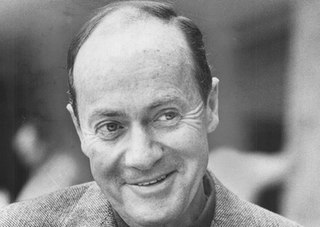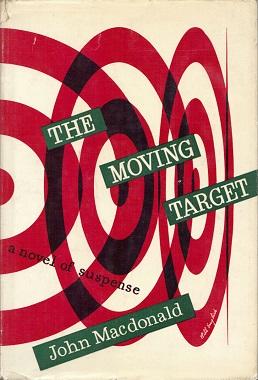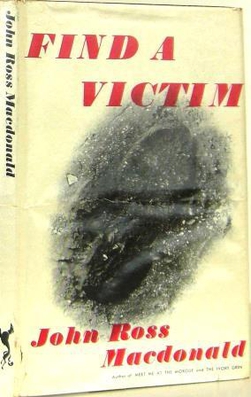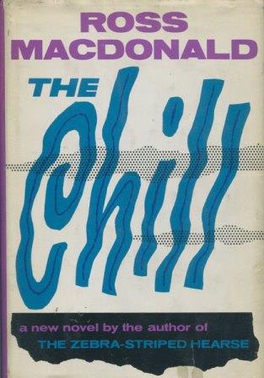
Mystery is a fiction genre where the nature of an event, usually a murder or other crime, remains mysterious until the end of the story. Often within a closed circle of suspects, each suspect is usually provided with a credible motive and a reasonable opportunity for committing the crime. The central character is often a detective, who eventually solves the mystery by logical deduction from facts presented to the reader. Some mystery books are non-fiction. Mystery fiction can be detective stories in which the emphasis is on the puzzle or suspense element and its logical solution such as a whodunit. Mystery fiction can be contrasted with hardboiled detective stories, which focus on action and gritty realism.

Ross Macdonald was the main pseudonym used by the American-Canadian writer of crime fiction Kenneth Millar. He is best known for his series of hardboiled novels set in Southern California and featuring private detective Lew Archer. Since the 1970s, Macdonald's works have received attention in academic circles for their psychological depth, sense of place, use of language, sophisticated imagery and integration of philosophy into genre fiction. Brought up in the province of Ontario, Canada, Macdonald eventually settled in the state of California, where he died in 1983.
Lew Archer is a fictional character created by American-Canadian writer Ross Macdonald. Archer is a private detective working in Southern California. Between the late 1940s and the early '70s, the character appeared in 18 novels and a handful of shorter works as well as several film and television adaptations. Macdonald's Archer novels have been praised for building on the foundations of hardboiled fiction by introducing more literary themes and psychological depth to the genre. Critic John Leonard declared that Macdonald had surpassed the limits of crime fiction to become "a major American novelist" while author Eudora Welty was a fan of the series and carried on a lengthy correspondence with Macdonald. The editors of Thrilling Detective wrote: "The greatest P.I. series ever written? Probably."

The Moving Target is a detective novel by writer Ross Macdonald, first published by Alfred A. Knopf in April 1949.

The Drowning Pool is a 1950 mystery novel by American writer Ross Macdonald, then writing under the name John Ross Macdonald. It is his second book in the series revolving around the cases of private detective Lew Archer and was published by Alfred A. Knopf in the US and in 1952 by Cassell in the UK.

Blue City is a thriller written in 1947 by Ross Macdonald. The novel was originally released under his real name, Kenneth Millar, by Alfred A. Knopf, while a condensed version was serialized in the August and September 1950 issues of Esquire.

The Galton Case is the eighth novel in the Lew Archer series by American writer Ross Macdonald. It was published in the US in 1959 by Knopf and in 1960 by Cassel & Co in the UK. The book has been widely translated, although the title has been changed in some cases to highlight other aspects of the story. In French it appeared as Un Mortel Air De Famille ; in Turkish as Ölmek Yasak ; in Finnish as Rouva Galtonin perillinen ; and in Italian as Il ragazzo senza storia. Macdonald thought that with this novel he found his own voice as a writer.

The Doomsters is a 1958 mystery novel by American writer Ross Macdonald, the seventh book in his Lew Archer series.
The Kane family is a fictional family on the ABC daytime soap opera All My Children, and reside in the fictional town of Pine Valley. The family debuted when the show debuted, being one of the core families on the show alongside the Martins and the Tylers.

"Gods and Mortals" is a seven issue comic book story arc plotted and drawn by George Pérez, with scripting by Greg Potter and Len Wein.

The McQueen family is a fictional family in the Channel 4 soap opera Hollyoaks. The family first appeared in 2006 and the family have been involved in a number of the show's most high-profile storylines, most notably John Paul McQueen's affair with Craig Dean ; Jacqui McQueen's whirlwind relationship with Tony Hutchinson ; Myra McQueen's long-lost son Niall Rafferty's revenge on his family by holding them hostage in an abandoned church and blowing it up, ultimately killing his half-sister Tina Reilly ; Theresa McQueen's pregnancy by her cousin Carmel McQueen's fiancé Calvin Valentine and later shooting him dead on their wedding day; Mercedes McQueen's affair with her fiancé Riley Costello's father Carl ; being kidnapped by Riley's grandfather Silas Blissett, Jacqui coping with the death of her husband Rhys Ashworth in a bus crash, learning that he had been having an affair with Cindy Cunningham and that he got Sinead O'Connor pregnant; Mercedes stalking Mitzeee and stabbing herself and framing her; Carmel's facial disfigurement; Myra faking her own death to escape her daughter Mercedes' evil husband, Dr. Paul Browning ; Mercedes killing her husband Doctor Browning by striking him over the head with a shovel; John Paul's male rape at the hands of his pupil Finn O'Connor ; the train crash which ultimately killed Carmel; Mercedes faking her death to help Grace Black get revenge on Freddie Roscoe ; Theresa donating her kidney to Nico Blake ; Porsche and Cleo McQueen's sexual abuse at the hands of their mother Reenie McQueen's fiancé Pete Buchanan ; Phoebe McQueen's murder in hospital by the Gloved Hand Killer; the stillbirth of Mercedes' baby Gabriel; John Paul's transgender boss Sally St. Claire being revealed as his biological father, Mercedes being framed for drugs by Joanne Cardsley, Celine McQueen and Diego Salvador Martinez Hernandez De La Cruz's sham wedding for money; Celine being murdered by her ex-boyfriend and serial killer Cameron Campbell after discover he causes the fire at the fair on Halloween 2016; Hunter affair with his teacher Neeta Kaur, leads his feud with his fiance Mac Nightingale ; Prince's marriage to Lily Drinkwell and Breda turning out to be a serial killer.

Raven Black is a 2006 novel by Ann Cleeves that won the Duncan Lawrie Dagger Award for the best crime novel of the year. Raven Black is the first in the "Shetland" mysteries, a series of eight novels by Cleeves, composed of two quartets, all set in Shetland.

Find a Victim is a novel by Canadian-American author Ross Macdonald, the fifth in a series featuring detective Lew Archer. It was published as a Borzoi Book by Alfred A. Knopf in 1954 and mass marketed by Bantam Books in the following year. The first British hardback was published in Cassell & Company's Crime Connoisseur series in 1955, the same year that a French translation appeared as Vous qui entrez ici. At this period the author was writing under the name John Ross Macdonald and was also identified as Kenneth Millar on the Knopf dust jacket.

The Ivory Grin is Ross Macdonald's fourth Lew Archer detective novel, published in April 1952. Like most of Macdonald's, the plot is complicated and takes place mostly in out of the way Californian locations.

The Barbarous Coast is a 1956 detective novel by Canadian-American author Ross Macdonald, the sixth to feature private investigator Lew Archer and his eleventh novel overall. It was published by Alfred A. Knopf in hardcover, and by Bantam Books as a paperback. The plot follows Archer's attempt to locate a missing young woman who is associated with an upscale country club. The novel takes an acid view of Southern California society that foreshadows Macdonald's later treatment of cross-generational deterministic themes.

Meet Me at the Morgue is the ninth novel completed by Ross Macdonald. Credited at the time to John Ross Macdonald, it was published in 1953 by A. A. Knopf and released as a paperback by Pocket Books the following year. In that year too the book was published by Cassell & Co in the UK under the title Experience with Evil. There had been disagreement over the novel's original title. Knopf turned down Macdonald's suggestion of Message from Hell and Macdonald turned down the suggestion of The Convenient Corpse from Pocket Books.

The Chill is Ross Macdonald's eleventh Lew Archer novel, published by Alfred A. Knopf in their Borzoi series in 1964. Macdonald's reputation was now growing and the front cover bore the announcement "a new novel by the author of The Zebra Striped Hearse", which had been well received. After the book was published by Collins Publishers in the UK that year, it went on to gain the Silver Dagger award for 1964 from the British Crime Writers Association. A French translation also appeared in 1964, followed by a Danish translation the following year and an Italian translation in 1967.

The Far Side of the Dollar is the 12th detective novel by Ross Macdonald to feature his private eye, Lew Archer. A condensed version was published by Cosmopolitan in 1964; in 1965 the full version appeared in the US from Alfred A. Knopf and in the UK from Collins Publishers.
















